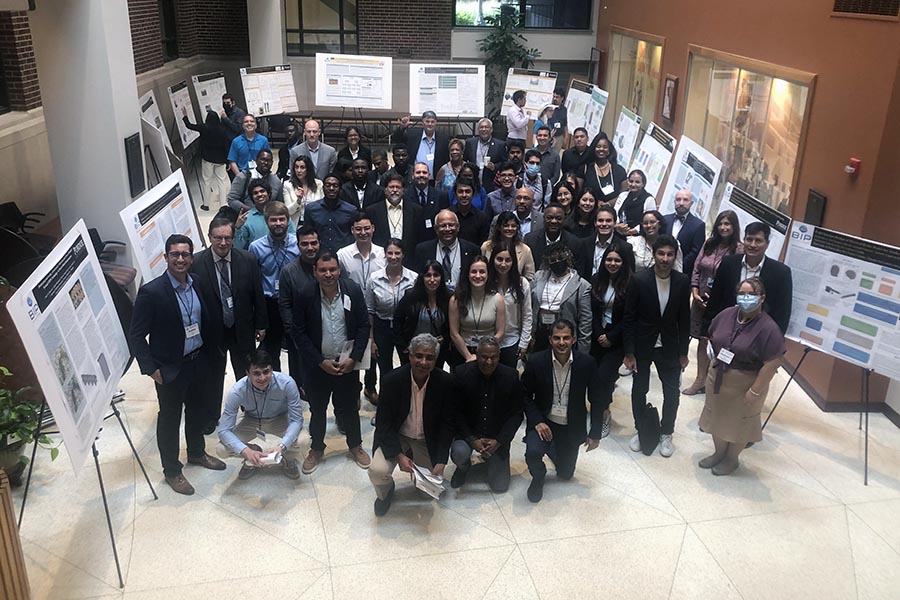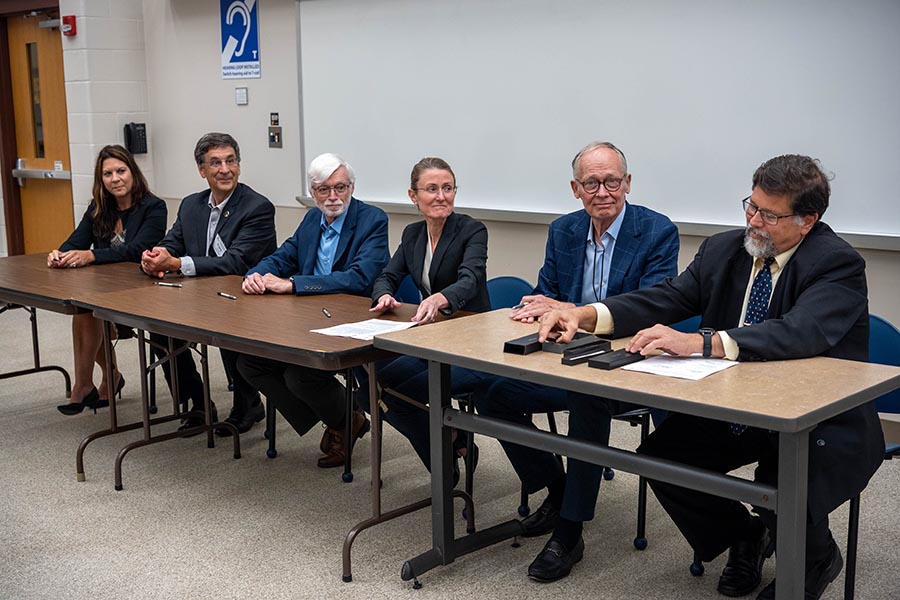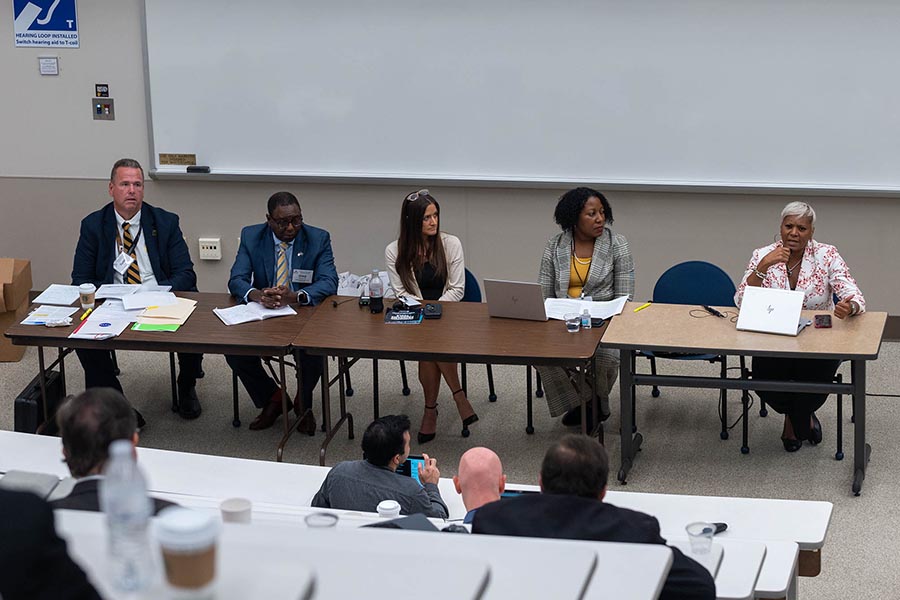Purdue University, Purdue Global sign MOU with University of Puerto Rico-Bayamon to solve critical issues related to climate change and renewable energy

Purdue University hosted a four-day conference packed with content aimed at building a diverse STEM workforce, promoting sustainability and climate change, and collaborating with the best and brightest minds worldwide to solve critical problems around the globe.
Blue Integrated Partnerships (BIP), a consortium of Historically Black Colleges and Universities (HBCU) and Minority Serving Institutions (MSI) funded by the Office of Naval Research, hosted the July 29-Aug. 1 conference: “2050 Workforce: Ready to Solve Tomorrow’s Challenges.” By the event’s conclusion, a memorandum of understanding (MOU) between the University of Puerto Rico (UPR)-Bayamon, Purdue University and Purdue Global was formalized with the intent of strengthening the institutions’ collaboration in the sphere of education, engineering, nursing, and research and innovation. The universities will focus on solving future critical issues related to climate change and renewable energy.
“We are very excited about our agreement with Purdue University and Purdue Global,” said Miguel Vélez-Rubio, chancellor of UPR–Bayamón. “Through this collaboration, we will be working together on diverse projects that should have important contributions for the development of Puerto Rico in critical areas such as renewable energy, coastal resiliency, health, security, and the aeronautics and aerospace industry. Through our online programs, we will be capable of providing important specialized training to provide the much-needed workforce in strategic areas aligned with the economic growth of the Island. This also has important implications in the future growth of UPR-Bayamón as a vehicle for innovation and education.”
Mark Lundstrom, interim dean of the College of Engineering and the Don and Carol Scifres Distinguished Professor of Electrical and Computer Engineering, applauded the decision, saying this partnership will play a pivotal role in addressing the world’s pressing problems.

“Purdue Engineering's partnership with the University of Puerto Rico system, especially the Bayamón campus, provides unique opportunities to develop new joint programs in areas of national need," Lundstrom said. "Aerospace engineering is one example that is critical to the U.S. As we grow our space program, we will need a diverse workforce that includes a strong Hispanic component. At the same time, we need an inclusive, diverse workforce to address the climate change challenge. Purdue Engineering is at the forefront of the Blue Integrated Partnerships with HBCUs and the U.S. Navy.
Frank Dooley, chancellor of Purdue Global, said the MOU is an important step in the online university’s commitment to access and diversity.
“Partnering with Purdue University and the University of Puerto Rico aligns with what Purdue Global stands for: worldwide access to a high-quality education that is respected and inclusive, practical and progressive and built for today and tomorrow," he said. "It strengthens the Purdue systemwide land-grant mission by engaging HBCUs and HSIs with the broader community to build a diverse employment pipeline that is prepared to solve the grand challenges of the future.”
Dooley was a participant in the BIP Conference panel, “Education-Mentorship-Innovation for Equity & Economic Prosperity: Breaking Barriers.”
During the conference, business and industry leaders, academic researchers, government agencies, and managers from the Department of Homeland Security’s (DHS) Small Business Innovation Research (SBIR) convened over the course of four days to discuss how to unlock the workforce of tomorrow from within MSIs, HSIs and HBCUs by leveraging unique capabilities at Purdue, national laboratories and NASA.
“Solving the world’s grand challenges — including climate change — will take diverse voices, experiences, faces and minds coming together to develop groundbreaking research with innovative solutions,” said Jay Akridge, provost and executive vice president for academic affairs and diversity who offered welcoming remarks at the event. “That means opening doors, encouraging and supporting young scientists, engineers and researchers and making sure they are fully engaged in the search for solutions. Purdue is proud to play a major role in the Blue Integrated Partnerships consortium with the University of Puerto Rico, Howard University and other HBCUs and MSIs to support the growth of a more diverse pipeline of these talented scholars.”
While promoting sustainable manufacturing in Puerto Rico for future electric aviation, conference leaders particularly focused on coastal resiliency by using the island of Puerto Rico as a living laboratory. In addition to Velez-Rubio, Puerto Rico’s conference delegates included representatives from Invest Puerto Rico and the Puerto Rico Department of Economic Development and Commerce.
“We need to design new materials that can capture CO2 while also building energy infrastructure — solar and wind power generators that can sustain category five hurricanes,” said Luciano Castillo, Purdue’s Kenninger Professor of Renewable Energy & Power Systems and the Dean’s Faculty Fellow for Hispanic Latino Engagement.

Speakers at the event included Torry Johnson, program manager at NASA Headquarters; Rod Chappell, education specialist in STEM engagement at NASA; and Darlene Bullock, executive director of the DHS Office of Small and Disadvantaged Business Utilization, who presented the keynote lecture, “The Ups and Downs to a Leadership Career: My Key Super Powers to Success.” On the final day of the conference, alumnus Rick Echevarria (BSIE 1988), vice president and general manager of Intel Response Technology Initiative, delivered the keynote, “Data and the Digital Age.”
Officials from the U.S. Department of Education, the National Academy of Engineering – Mexico, Raytheon Technologies, Collins Aerospace, Pratt & Whitney, Honeywell Aerospace, DXC Technologies, Rubidex, Intel, PrecisionWorx, the Department of Defense and the Department of Energy also participated.
The conference provided opportunities to share and exchange original research ideas, leverage unique facilities at Purdue and inspire future research paths. Additional topics and panel discussions centered around big data, education for 2050, security, social inclusion and gender equality, and sustainable manufacturing.
Castillo’s leadership was constant throughout the conference. He delivered introductory remarks each day, led the “Workforce and Infrastructure” session, chaired the “Breaking Barriers” panel and co-led — with UPR-Bayamon — the private lunch meeting with executives from the Caribbean Green Engine, a major NSF initiative focused on economic prosperity, and invited guests.
“Purdue Climate Scholars” from the six-week BIP Summer Institute for Climate Change and Sustainability also participated in the conference. Ranging from high school age to PhD candidate, the scholars worked in research clusters to tackle the BIP-targeted challenges of sustainability, health and security.
One of the outcomes of the institute was the production of a 15-minute mini-documentary highlighting six young people sharing stories of how their lives are interwoven with climate change. Through first-person narratives, they revealed their feelings and the stories behind crises that have forced them to study by the light of open-flame lamps in Nigeria and live without electricity for months in Puerto Rico. Jessica Eise, assistant professor in the Department of Communication at the University of Texas - San Antonio, led the project.
“Also within the summer program, we had a cohort of 20 refugee women who received business certifications from Purdue Global and participated in a business competition,” Castillo said. That project was led by Maissa Khatib, associate professor of practice, Women’s and Gender Studies, University of Texas - El Paso.
In addition, a cohort of 22 fellows from Central America participated in the summer institute and conference.
BIP, headquartered at Purdue, is a consortium of research universities, MSIs and federal partners. Members include academic partners Purdue Global, UPR – Rio Piedras, UPR – Bayamon, UPR – Mayaguez, North Carolina A&T University, Howard University, Florida Atlantic University, University of Texas – San Antonio, University of Texas – El Paso and Clark Atlanta University and federal partners NASA, Office of Naval Research, U.S. Naval Academy and Department of Homeland Security.

